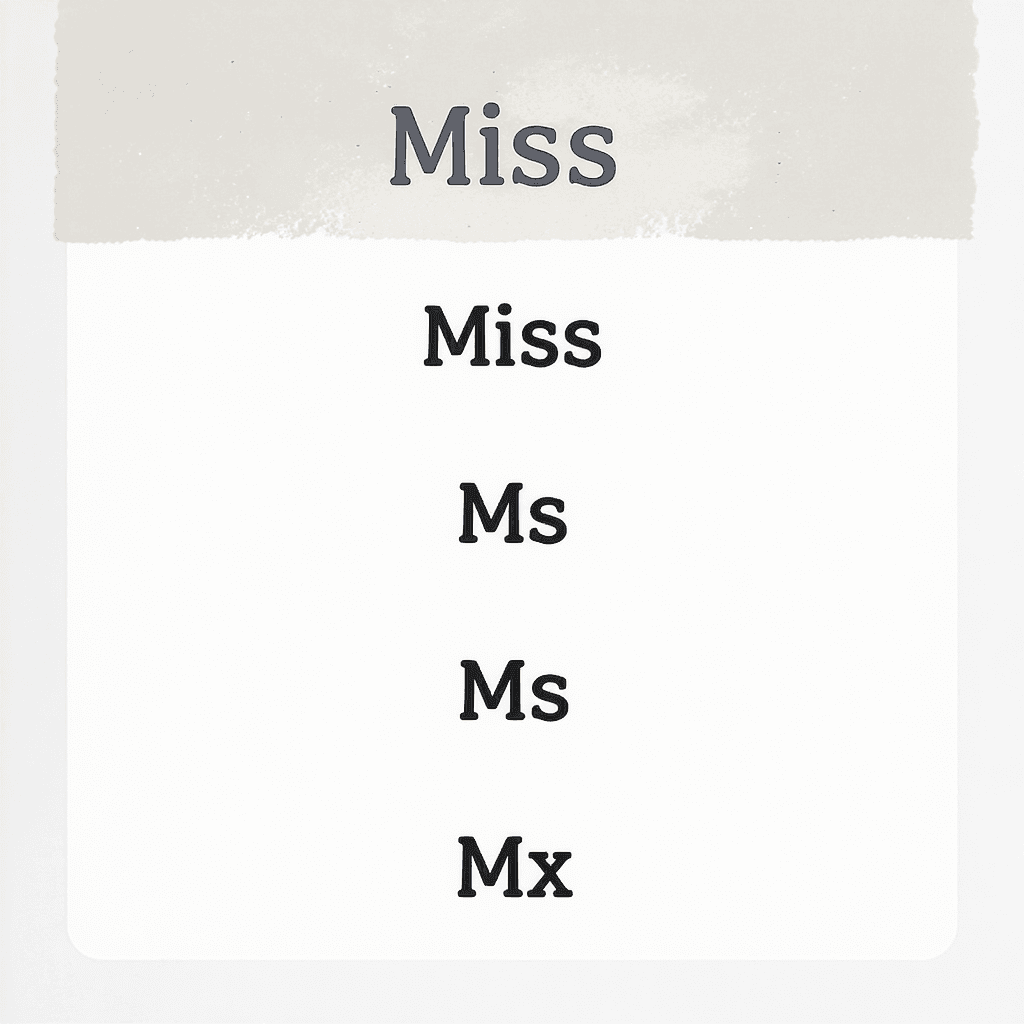Miss vs Mrs vs Ms vs Mx: What’s the Difference?
 Titles like Miss, Mrs, Ms, and the newer Mx may seem similar, but they tell different stories. These short words reflect social history, gender identity, and how language changes to become more inclusive. Let’s break down what each means and when you should use them.
Titles like Miss, Mrs, Ms, and the newer Mx may seem similar, but they tell different stories. These short words reflect social history, gender identity, and how language changes to become more inclusive. Let’s break down what each means and when you should use them.
Miss: The Traditional Title for Unmarried Women
“Miss” has been used for centuries to address unmarried women or girls. It traditionally marks youth or single status — for example, Miss Taylor or Miss Johnson.
In formal writing, “Miss” sounds polite but can sometimes feel outdated, especially when you don’t know someone’s marital status. In modern workplaces, people rarely use it outside of school settings or children’s references.
Example:
- Miss Carter will be your teacher this semester.
Mrs: Married Women’s Title
“Mrs” (pronounced Miss-iz) refers to married women and is often followed by the husband’s last name, like Mrs. Smith. Historically, it indicated a woman’s marital identity.
However, as gender equality evolved, many women prefer to keep their own surnames and choose Ms instead. Using “Mrs” today depends on personal choice — never assume based on age or appearance.
Example:
- Mrs. Johnson and her husband attended the ceremony.
Ms: The Neutral and Modern Option
“Ms” became popular during the women’s rights movement in the 1970s. It doesn’t reveal marital status — perfect for professional or polite communication when you don’t know whether someone is married or not.
If you’re unsure which to use, “Ms” is the safest, most respectful option. It balances formality and equality, making it sound more human and modern.
Example:
- Ms. Taylor will lead today’s meeting.
Mx: The Inclusive Modern Title
“Mx” (pronounced Mix) is a gender-neutral title for people who don’t identify as male or female. It’s becoming common in emails, official forms, and workplaces that support diversity and inclusion.
Using “Mx” shows awareness and respect for non-binary identities — and reflects how English evolves to match human expression.
Example:
- Mx. Jordan submitted the report earlier today.
Language Is Evolving — and So Should Your Writing
Titles like Miss, Mrs, Ms, and Mx show that language isn’t fixed. It changes with society, identity, and how we communicate respect. Choosing the right title makes your writing sound not just correct — but human.
That’s also why AI-generated writing often feels off: it lacks these subtle human choices. Tools like Humanizey help writers, marketers, and students transform robotic text into natural human writing that understands tone and nuance.
Quick Summary Table

FAQ
1. Is “Ms” or “Mrs” more polite?
Both are polite, but “Ms” is more modern and neutral, especially if you’re unsure of someone’s marital status.
2. How do you pronounce “Mx”?
It’s usually said as “Mix.” Some also pronounce it “Mux,” but “Mix” is widely accepted.
3. Is it okay to ask someone which title they prefer?
Yes — it’s always better to ask than to assume. Language is about respect and understanding.
4. How does this relate to humanized writing?
Choosing the right title is part of writing that feels natural and empathetic. Humanizey helps AI text make those same human-sounding choices.
